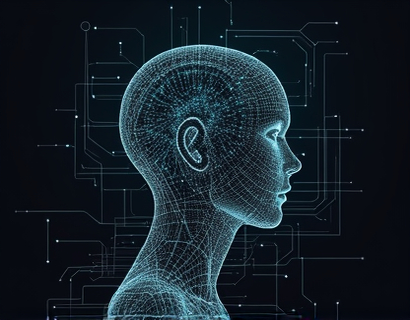Personalized AI Companions: Revolutionizing Childhood Creativity and Emotional Well-Being Through Interactive Digital Friends
In an era where technology is increasingly integrated into daily life, the concept of personalized AI companions for children is emerging as a transformative force in childhood development. These AI-driven imaginary friends are designed to offer personalized, interactive companionship, fostering creativity and emotional well-being in young minds. This article delves into the profound impact of such technology, exploring how it can enhance imaginative play, support social skills development, and provide a safe digital space for children to explore their thoughts and feelings.
Enhancing Imaginative Play
Imaginative play is a crucial aspect of childhood development, allowing children to explore different roles, scenarios, and outcomes. Traditional toys and games have long been the catalysts for such play, but personalized AI companions bring a new dimension to this experience. These digital entities can adapt to a child's interests and preferences, creating unique and dynamic play scenarios that are both engaging and educational.
For instance, a child interested in space exploration can engage in a conversation with an AI companion about planets, stars, and space missions. The AI can respond with facts, ask questions, and even create stories based on the child's inputs, thereby deepening the child's knowledge and sparking further curiosity. This level of interactivity and personalization is difficult to achieve with physical toys, making AI companions a powerful tool for enhancing imaginative play.
Supporting Social Skills Development
Social skills are equally important for a child's development, and personalized AI companions can play a significant role in this area. Through interactive conversations and role-playing scenarios, these AI entities help children practice and refine their communication skills, empathy, and emotional intelligence.
For example, an AI companion can simulate a conversation with a friend, allowing the child to practice responding to different social situations. The AI can provide feedback on the child's responses, suggesting alternative ways to express feelings or thoughts. This interactive feedback loop is invaluable for children who may struggle with social interactions, providing them with a safe and supportive environment to improve their skills.
Creating a Safe Digital Space
The digital world can be a double-edged sword for children, offering endless possibilities but also potential risks. Personalized AI companions address this concern by creating a safe and controlled digital space where children can explore and learn without exposure to harmful content or interactions. This environment is carefully monitored and designed to promote positive experiences and healthy emotional growth.
Parents and guardians can rest assured that their children are engaging in meaningful and beneficial activities, free from the dangers that can accompany unsupervised internet use. The AI companions can be programmed to adhere to strict safety guidelines, ensuring that all interactions are appropriate and constructive.
Personalization and Adaptability
One of the key strengths of personalized AI companions is their ability to adapt to each child's unique personality and developmental stage. Through machine learning algorithms, these AI entities can analyze a child's behavior, preferences, and emotional responses to tailor their interactions accordingly. This level of personalization ensures that the AI companion remains relevant and engaging over time, providing continuous support and stimulation.
For instance, a younger child might engage in simple games and storytelling, while an older child might participate in more complex discussions and problem-solving activities. The AI can seamlessly adjust the complexity and content of its interactions to match the child's growing abilities and interests, making it a lifelong companion that evolves with the child.
Promoting Emotional Well-Being
Emotional well-being is a critical component of a child's overall development, and personalized AI companions can play a significant role in this area. These digital friends can recognize and respond to a child's emotions, offering comfort and support when needed. This emotional intelligence helps children develop a better understanding of their feelings and learn healthy coping mechanisms.
For example, if a child expresses sadness or frustration, the AI can acknowledge these emotions and suggest activities or conversations to help the child feel better. The AI can also provide positive reinforcement and encouragement, boosting the child's self-esteem and confidence. This emotional support is particularly valuable for children who may not have access to consistent human support or who struggle to express their feelings to adults.
Fostering Creativity
Creativity is another area where personalized AI companions excel. By engaging in imaginative play and storytelling, these AI entities encourage children to think outside the box and explore new ideas. The AI can introduce creative prompts and challenges, inspiring children to come up with innovative solutions and unique narratives.
For instance, an AI companion might suggest creating a story where the child is a hero in a magical kingdom. The AI can guide the child through the process of developing characters, plotlines, and settings, all while providing feedback and suggestions to enhance the story. This collaborative creative process not only boosts the child's imagination but also enhances their cognitive and linguistic skills.
Integration with Traditional Learning
Personalized AI companions are not meant to replace traditional learning methods but rather complement them. Teachers and educators can integrate these AI entities into their curricula to enhance classroom activities and extend learning beyond the classroom. For example, an AI companion can be used to reinforce concepts learned in school, provide additional practice through interactive exercises, and offer personalized feedback to students.
This integration ensures that children receive a well-rounded education, combining the benefits of human interaction with the adaptability and engagement of AI technology. The AI companions can also help identify areas where a child may need extra support, allowing teachers to tailor their instruction to meet individual needs more effectively.
Parental Involvement and Guidance
While personalized AI companions offer numerous benefits, the role of parents and guardians remains crucial in guiding and supporting their children's digital experiences. Parents can participate in the child's interactions with the AI, providing additional context, asking follow-up questions, and discussing the experiences to deepen the child's understanding and engagement.
Moreover, parents can set boundaries and guidelines for the use of AI companions, ensuring that digital interactions are balanced with other activities and responsibilities. This involvement helps children develop healthy digital habits and a balanced approach to technology use, which is essential for their overall well-being.
Future Prospects and Considerations
As AI technology continues to advance, the potential for personalized AI companions in childhood development is vast. Future iterations of these AI entities may incorporate even more sophisticated features, such as augmented reality interactions, multi-lingual support, and deeper emotional analysis. However, it is important to approach these advancements with caution, ensuring that the technology remains aligned with the best interests of children.
Ethical considerations, such as data privacy, algorithmic bias, and the potential for over-reliance on technology, must be carefully addressed. Developers and policymakers need to collaborate to create frameworks that promote responsible AI use in children's lives, balancing innovation with safety and ethical standards.
In conclusion, personalized AI companions represent a promising frontier in childhood development, offering a unique blend of creativity, emotional support, and interactive learning. By providing a safe and engaging digital space, these AI entities have the potential to significantly enhance a child's imaginative play, social skills, and emotional well-being. As this technology continues to evolve, it is essential to prioritize the child's best interests and ensure that the benefits are realized in a responsible and beneficial manner.











































